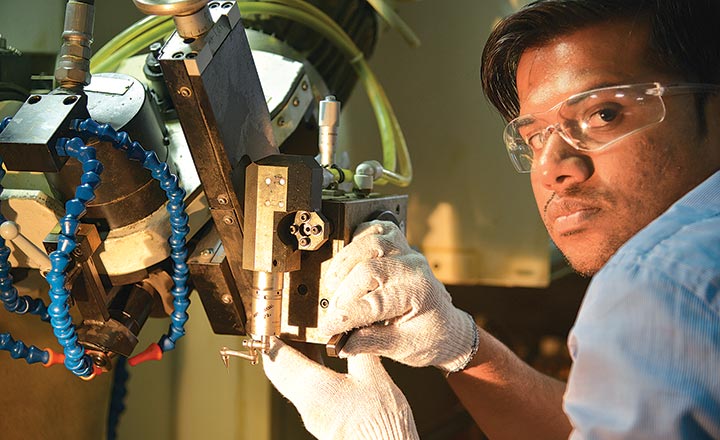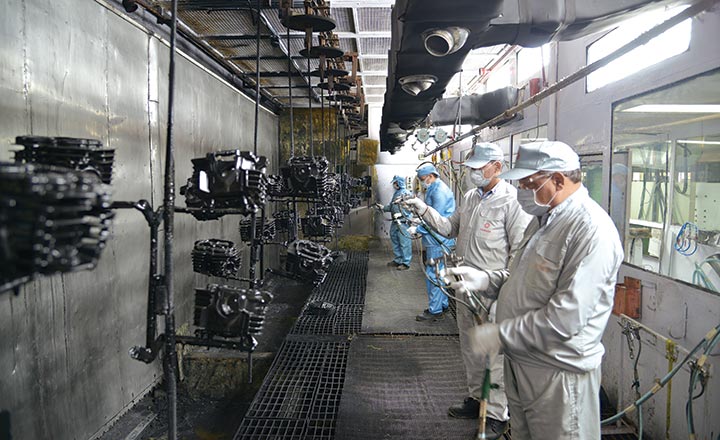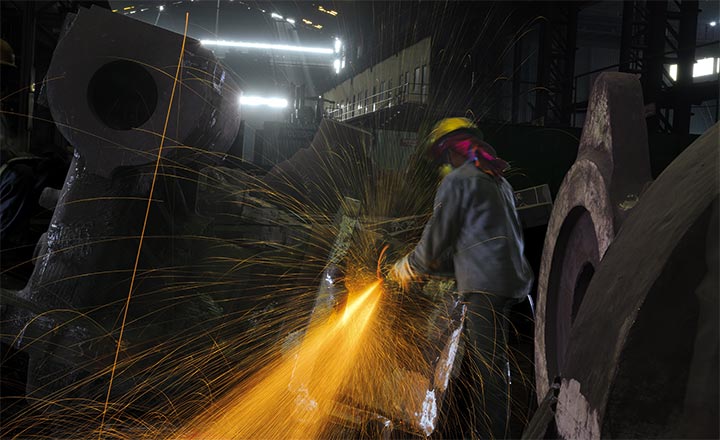Saket Bhatia can’t hide his contentment. Sitting in one of Bony Polymer’s seven auto components factories in Faridabad, he talks about how good the last year was for the automotive sector. “Anybody associated with major auto OEMs should have clocked a 15-20% growth over the past one year,” says Bhatia, director at Bony Polymers. Bhatia is coy about revealing his own group’s turnover but industry sources estimate it to be around Rs.1,000 crore.
Faridabad has a fair number of automotive suppliers. 2017 has been a great year, which obviously translates to tidy business for ancillary units as well. Bony Polymers makes plastic and rubber components, hoses, and metal components for OEMs. Starting in Faridabad in 1981, the company today has 12 plants across Manesar, Lucknow and Gujarat.
Some 20 km away from Faridabad where Bhatia sits, JCB has a large plant in Ballabhgarh. The construction equipment giant has been present in this cluster for almost 40 years. JCB, along with Escorts, happens to be the oldest and largest industrial unit in this area. The management is happy too and Vipin Sondhi, CEO, JCB India, is thankful that good times are back.
The Indian construction equipment industry has revived after a four-year downturn, primarily driven by the roads and highways sector. “2017 was a positive year for us as we crossed our previous best high of 2011,” says Sondhi with some cheer. In 2011, the company had sold a record 27,000 units. GST could have spoiled JCB’s party but luckily, it did not turn out that way when the government decided to slash the GST rate from the initial 28% to 18% in November 2017, after representation from the industry. The lowering of the GST rate came as a relief to JCB.

Positive nudge
While excavatorswere back on the road after a pause, two-wheelers, too, managed to survive the GST disruption. At Yamaha’s factory on Mathura Road in Faridabad, where women workers are busy assembling engine parts, the plant head informs us that they have found women to be better at such jobs which require precision. The factory itself is pretty old and has changed hands in the past, from Escorts to Yamaha. In fact, for a long time Escorts rolled out Rajdoot motorcycles with technological support from Yamaha. But today, Yamaha operates on its own in the Indian two-wheeler market, in the premium segment.
Sanjiv Paul, senior VP, Yamaha says, “There was a slight slump in the market owing to demonetisation, ban on BS III vehicles and implementation of GST. But with normal monsoon and positive buying sentiments ahead of the festive season, the Indian two-wheeler industry saw demand return in full force.” Despite the disruption, the industry has managed to grow in double digits. Yamaha was able to sell 77,887 units in August 2017 compared with 74,868 units in August 2016. In comparison, Yamaha sold 44,517 units in December 2017 versus 49,775 units in December 2016.
That buoyancy apart, for the automotive sector today, the future looks rather hazy as the global trend towards electric vehicles gains momentum. “The entire automotive industry has to move to the next level of Bharat Stage Emission Standards —from BS3 to BS6, before a possible transition towards electric. That means we might be making investments that would be relevant only for the next 10 years,” articulates Bhatia. “An electric vehicle may end up using far lesser components than what we use today, making a large part of the industry irrelevant. How do we deal with this?”

If auto-makers are a bit edgy about the future, there are others who are all gung-ho about investing for the days ahead. Faridabad has a good number of other industries, although auto is the largest. Sanjiv Khemka, managing director, KCL, whose company is into packaging, cereals, nutraceuticals and dairy, is gearing up to invest, betting on growing consumer spending. He admits that the growth in the current fiscal hasn’t been in line with projections because of disruption like GST, but he remains unfazed. “We are happy that consumer spending is back to normal,” says Khemka. “We are not export-but a consumer-driven economy. We have a consumer base ready to explode. It will happen, as incomes go up,” he says.
Set up in Faridabad by his father in 1983, KCL today runs paper packaging plants in Faridabad, Nalagarh (Himachal Pradesh), Greater Noida, Tamil Nadu, and Andhra Pradesh. Besides, the company has a dairy each in Maharashtra which makes cheese and butter, and tofu in Faridabad. “We have made investments of around Rs.100 crore in two new plants in the past three years, one in Faridabad and the other in Andhra for paper packaging. You only invest when you see growth. We see good growth happening over the next 10 to 20 years,” Khemka says. Their food products are sold under the Murginns and Moos brand. The latter is a a high-end cheese brand sold through selective stores in India’s largest cities.
On track
Star Wire, which is involved in casting gigantic steel parts and caters to large industries and government, exudes similar optimism. One can see gigantic parts being welded inside the shed of its steel plant.Inside the factory office, SK Goel, executive director, proudly talks about their products and clients. The company makes bulletproof jackets, special steel for the defence sector, steel for VVIP vehicles and turbines for the energy sector. The company also caters to the space sector, having supplied steel for cryogenic engines and rockets to ISRO. Founded by the Gupta family in 1981, Goel has been handling it for the past 28 years.
He is excited about the big opportunity around private sector participation in the defence sector. According to him, while some major projects are yet a work in progress, the Defence Procurement Policy’s revised version will bring some benefits. “They have identified 29 items which the government will not produce and will be sourced from the private sector. Once fully implemented, there will be good business for us,” he says. Star Wire did Rs.600 crore worth of business last year. Goel says, “Since the government is mainly focusing on solar energy, we don’t have an order book as before. But we will still have a growth of 10-15% by end of this fiscal, thanks to other verticals.”

This streak of optimism permeates through Faridabad. “Business has been growing fast August onwards. GST issues have settled in most industries,” says Navdeep Chawla, managing director, Psychotropics India, and the former president of Faridabad Industries Association. His company makes branded generics. In the last fiscal year, it clocked Rs.240 crore, of which Rs.40 crore was exports. In the current year, he expects the revenue to be same having been affected in July and August owing to GST implementation. “But we are happy with the overall growth. Healthcare sector has got impetus because of growing health insurance and government’s schemes such as Jan Aushadhi and liberal budgets for medical institutions. Exports are also picking up,” he says. With all the big shifts behind, Chawla is going ahead and adding one more plant. Already 1,000 people work for his company. “We are going to hire 500 more in the next fiscal,” he says.
Ageing infrastructure
While industries seem happy about growth, the charm of Faridabad as a vendor base for the automotive sector has diminished. For a long time, Faridabad suffered due to poor connectivity to rest of NCR. Although that has changed with good highway, toll roads, and metro having come up over the past eight years, automakers have added Gujarat as a manufacturing base. “If your OEM moves, you have to,” says Bhatia.
Today, while the ecosystem for the auto sector is still evolving in Gujarat, Faridabad continues to be a strategic location to cater to OEMs in Gurgaon-Manesar (Haryana) as well as Noida. Bhatia says, “A part of the KMP (Kundli-Manesar-Palwal) ring road has opened up. That helps us directly transport to OEMs in and around Manesar, bypassing Delhi. Connectivity to Delhi is also a lot better now.”
JCB’s Sondhi recalls why Faridabad was chosen by his company. The reasons to manufacture from here remain almost the same 40 years later. “The Delhi-NCR region of Faridabad provided requisite infrastructure and skilled workforce to establish a large-scale manufacturing facility. Its proximity to Delhi, access to the international airport and highways for logistics efficiency were added benefits. A vibrant vendor base is another significant pillar that ensures smooth operation,” he says.
JCB’s factory in Ballabhgarh near Faridabad, is the world’s largest excavator plant, manufacturing 110 machines per day. It is also the headquarters for JCB in India.
The irritant, now, is the poor state of industrial infrastructure such as internal roads, drainage and sewage disposal systems. “We face the typical issues of a 40-50 year old industrial area. The old infrastructure has not been able to match up to the industrial growth over decades,” says Khemka. Sondhi adds, “Solid waste management and public transport in the arterial areas need further push.” Paul of Yamaha also complains about water logging during the rainy season.
Fortunately, the state government seems willing to resolve these problems. About Rs.180 crore has been allocated to upgrade the old infrastructure in the area recently. “They have surveyed all the old industrial areas and a tender has been floated to refurbish sewerage and roads,” says Khemka. Not just that, Chawla goes on to praise the state government as well. “We see a dramatic change in top level governance. The decisions are taken very quickly,” he says.
Another major relief for businesses is the reversal in the power situation. “Power used to be a problem earlier. Over the past seven years, it has become stable, at least for large consumers like us. Now there are different sources of power. We can directly buy from the grid, reducing dependence on the state government,” says Goel.
Businessmen are pinning their hopes on this improved governance for a lasting positive change. Meanwhile, businesses in Faridabad are bullish about the future and feel that reforms like GST will make India a single market and build a good foundation for Make in India.











